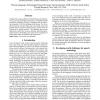Free Online Productivity Tools
i2Speak
i2Symbol
i2OCR
iTex2Img
iWeb2Print
iWeb2Shot
i2Type
iPdf2Split
iPdf2Merge
i2Bopomofo
i2Arabic
i2Style
i2Image
i2PDF
iLatex2Rtf
Sci2ools
INTERSPEECH
2010
2010
Voice search for development
In light of the serious problems with both illiteracy and information access in the developing world, there is a widespread belief that speech technology can play a significant role in improving the quality of life of developing-world citizens. We review the main reasons why this impact has not occurred to date, and propose that voice-search systems may be a useful tool in delivering on the original promise. The challenges that must be addressed to realize this vision are analyzed, and initial experimental results in developing voice search for two languages of South Africa (Zulu and Afrikaans) are summarized.
Related Content
| Added | 18 May 2011 |
| Updated | 18 May 2011 |
| Type | Journal |
| Year | 2010 |
| Where | INTERSPEECH |
| Authors | Etienne Barnard, Johan Schalkwyk, Charl Johannes van Heerden, Pedro J. Moreno |
Comments (0)

